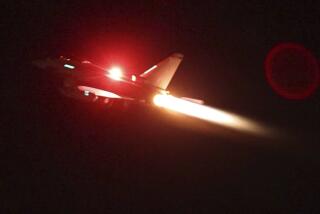In Asia, Another Good Deed Goes Well-Punished
- Share via
It’s regrettable that, at a time when the Australian government deserves worldwide approbation for its humanitarian decision to lead a peacekeeping force into violence-wracked East Timor, race-baiting and finger-pointing are spoiling this otherwise commendable picture. A top Malaysian official, to cite just one example, accused Australia of “sitting in a white chair and supervising the colored chairs.” Granted, Australian Prime Minister John Howard has committed a string of verbal miscues that did seem to imply that only Australia could save Asia.
Yet self-aggrandizement aside, this extraordinary multinational operation in East Timor has the potential of becoming Asia’s shining moment. Rather than having averted its eyes from the continuing slaughter, a makeshift coalition has forced Jakarta to back off. The diversity of the multinational military response has been stunning. Australia will send more than 4,000 troops, but among the other Asia-Pacific participants are the Philippines with 1,000 troops, New Zealand (800), Thailand (more than 1,000) and South Korea (420).
“This is the first time since the Vietnam War that we Koreans have sent infantry troops overseas in a peacekeeping capacity,” South Korean Foreign Minister Hong Soon Young proudly told me prior to a speech to the Los Angeles World Affairs Council on Friday.
Others on the ground will include Canada (600), France (500), Italy (650) and even Britain (250). Singapore is sending a few hundred medics and military observers. The decision to mount such an operation hasn’t been domestically easy. In Bangkok, for example, the Thai government has had to weather a ferocious political storm. Explained Thai Foreign Minister Surin Pitsuwan in an interview last week in Los Angeles: “Many Southeast Asian countries were encouraged to be, or had every reason to be, silent, to let Indonesia take care of itself. But we’ve done the right thing. And Australia is the very best choice to lead the effort. Everyone is frustrated by the region’s problem of violence.”
Everyone is also concerned about the considerable cost of multiyear peacekeeping. Monday, however, Japan came through with a big check that will cover almost half the bill; financing others’ interventions is just about the only military option open to a Japanese government hemmed in by the country’s restrictive post-World War II constitution. Even China is contributing a civilian police unit. This is a surprise. Ever since the Western air war in the Serbian province of Kosovo, China has been increasingly grumpy about proposed international interventions. Indeed, in Auckland last month at the APEC summit, a major diplomatic row with the Chinese was narrowly averted by New Zealand Prime Minister Jenny Shipley. After President Jiang Zemin threatened to walk out if the East Timor issue was even discussed at the leaders’ final dinner, she yanked the issue off the dinner-table menu.
Since then, however, U.N. Secretary-General Kofi Annan and Southeast Asian diplomats at U.N. headquarters in New York have worked hard to alleviate Beijing’s paranoia. They have emphasized that, unlike Kosovo, the government in Indonesia formally invited foreign forces into East Timor to pave the way for the expected U.N. takeover.
Something else helped cool off China: the fact that Washington hasn’t been overtly in the Timor lead, unlike in Kosovo. However, this has been by default, not design. Despite Howard’s back-channel efforts since December to draw Washington’s attention to East Timor, the Clinton administration has been irritatingly but characteristically slow to respond, just as two years ago it was late reacting to the Asian financial flu surfacing in Thailand. That’s because, seen through the Beltway telescope, Asia seems as distant as Mars.
The president didn’t publicly warn Jakarta that it would lose Western aid with its continued tolerance of East Timor terror until just before boarding Air Force One for the APEC summit last month.
Since then, however, Clinton has handled this well, which is vital: An unstable Indonesia, the fourth most populous state in the world and a mammoth presence in the region, is incompatible with Asian stability. It is just too big a fish in that roiling pond.
The decision to compel Jakarta to accept the international force could prove a signal turning point for Asia. As Thailand’s Pitsuwan put it in a passionate U.N. General Assembly speech last month: “More and more, we in the international community are being faced with the conflicts within states, not between or among states [as] in the past. The traditional concepts of security are woefully inadequate to meet the new challenges faced by mankind. The very narrow scope of its definition serves as an intellectual straitjacket, which limits our ability to conceptualize and respond to the new threats of our time.”
This time, however, Asia and the world have responded by wisely expanding the definition of what is permissible and what is not. It is rarely wrong to attempt to do the right thing. Yet in world politics, sometimes the worst transgression of the norm, besides invasion, can be a good deed. The irony of the East Timor intervention is that some in Asia may never forgive Australia for trying to do the right thing.
Times contributing editor Tom Plate’s columns run Wednesdays. The full text of the Pitsuwan interview can be found at https://www.asiamedia.ucla.edu.
More to Read
Sign up for Essential California
The most important California stories and recommendations in your inbox every morning.
You may occasionally receive promotional content from the Los Angeles Times.













